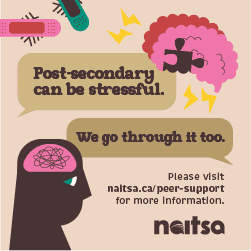We know a) that sleep is the most important thing we can do for mental and physical health, and good school/work performance, and b) that most of us don’t get nearly enough. While you sleep:
• Your brain recharges
• Your cells repair
• Your body releases important hormones
• You recuperate both physically and mentally
• Your immune system rejuvenates
• You may process emotional issues that occurred during the day Sleep deprivation affects:
• Your energy level, your ability to focus, your ability to concentrate and learn, your decision making and critical thinking skills, your judgement, your reaction time and even your visual alertness – in short your overall academic performance.
• Your mood. Depression and irritability increase, and ability to handle stress decreases.
• Your appetite (which increases and can therefore cause weight gain) and your sex drive (which decreases).
• The Incidences of motor vehicle accidents due to decreased focus and alertness. In addition:
• Chronic sleep deprivation may contribute to diseases such as diabetes, high blood pressure, heart disease and mental health problems, as well as lowered immunity to colds and flus.
• Sleeping less than seven hours each night reduces your life expectancy.
Are you sleep deprived? If any of the following are true, you may be sleepdeprived: your alarm clock wakes you up, you have trouble getting out of bed in the morning, you fall asleep in five or less minutes at night (the ideal is 10-15 minutes to fall asleep which means you are still tired enough to sleep well, but not exhausted), you nod off during the day and/or you need coffee or energy drinks to keep you alert.
The optimal amount of sleep time for college-aged students is eight to nine hours per night. Students are often sleep deprived and unfortunately, over time, this begins to feel normal. Some research shows that the most restorative sleep occurs between 10 – 12 p.m.
How to improve your sleep
• As much as possible, have regular sleep and waking hours. A regular eating routine is also beneficial for good sleep.
• Have a consistent sleep environment free of distractions. Ideally your bedroom should not be used for anything except sleep.
• Your bedroom should be cool and dark at nighttime, and your bed should be comfortable and supportive.
• Keeping your sleep environment clutter free and removing study materials from sight can be helpful. If you do study in your bedroom try to tidy your desk before you go to bed.
• The light emitted from electronic devices, including LED lighting on alarm clocks, can affect sleep. If you use an LED alarm clock try and point it away from you.
• Develop a regular bed-time routine. Including something relaxing such as reading a novel, listening to music, a warm bath, or meditation can improve your sleep quality. Writing down 3 things you are grateful for right before you go to bed reduces depression and stress, and can improve sleep.
• Avoid your computer for at least two hours before bed. The light from computers mimics daylight and triggers your brain to become alert. Ideally you should avoid watching television one hour before bed as well. Use blue-blocking glasses or blue light reduction apps if you cannot avoid electronics before bed. If you wake up during the night computer usage close to bedtime may be the cause.
• Stop eating about three hours before going to bed. Eating too close to bedtime interferes with the release of melatonin which is important for sleep. However some people find a high protein snack, such as a small handful of almonds before bed, helps them sleep.
• Avoid overuse of caffeine. Caffeine remains in the system for six to eight hours so avoiding caffeinated foods and beverages after lunch can be beneficial.
• A regular exercise routine can help reduce cortisol, a stress chemical that interferes with sleep. Thirty second bursts of intense exercise several times a day can also reduce cortisol levels. Avoid intense exercise within two hours of bedtime.
• The optimal time to study is between 6-8 p.m. For most people the brain is most alert during those hours. Finish studying at least one hour before going to bed. This gives your brain time to organize the material and to relax and wind down before you sleep. Early afternoons are usually the time of least alertness.
• Plan ahead. Have your school materials packed, your clothes laid out, your food ready to grab and your keys visible the night before so you can sleep without worrying, and start the day in a relaxed state. • Have a realistic study plan and stick with it. Knowing that you have a plan and are doing the best you can will alleviate some of the stress that interferes with sleep. For problems with sleep, stress or any other personal concerns see a counsellor at NAIT Student Counselling. Counselling is free to registered NAIT students and is completely confidential.
If you would like further assistance book an appointment:
Counselling is free to registered NAIT students and is completely confidential.
Counsellors at Student Counselling can help you work towards healthier habits. Personal counselling is free, confidential and available to all currently registered NAIT students.
Main Campus: Room W111-PB in the HP Centre: Counsellors are available from 8-4:30 with extended hours for apprentices. Book in person or by phoning 780-378-6133.
Expanded hours:
Souch Campus: Counsellor available Wednesdays and Thursdays. Book by calling 780-378-6133 or in person in Room Z-153
Patricia Campus: Counsellor available Mondays and Tuesdays. Book by calling 780-378-6133.
– Margaret Marean, NAIT Student Couselling






